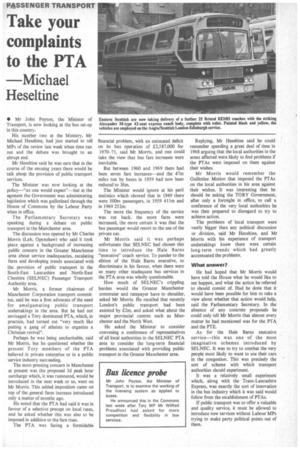Take your complaints to the PTA
Page 31

If you've noticed an error in this article please click here to report it so we can fix it.
Michael Heseltine
• Mr John Peyton, the Minister of Transport, is now looking at the bus set-up in this country.
His number two at the Ministry, Mr Michael Heseltine, had just started to tell MPs of the review last week when time ran out and the debate was brought to an abrupt end.
Mr Heseltine said he was sure that in the course of the ensuing years there would be talk about the provision of public transport services.
The Minister was now looking at the policy—"as one would expect"—but at the rRoment the Government was administering legislation which was guillotined through the House of Commons by the Labour Party when in office.
The Parliamentary Secretary was speaking during a debate on public transport in the Manchester area The discussion was opened by Mr Charles Morris (Lab, Openshaw) who said it took place against a background of increasing public concern in the Greater Manchester area about service inadequacies, escalating fares and developing trends associated with the provision of public transport in the South-East Lancashire and North-East Cheshire (SELNEC) Passenger Transport Authority area.
Mr Morris, a former chairman of Manchester Corporation transport commit tee, said he was a firm advocate of the need for amalgamating public transport undertakings in the area. But he had not envisaged a Tory dominated PTA, which, in practice, had turned out "very much like putting a gang of atheists to organize a Christian revival".
Perhaps he was being uncharitable, said Mr Morris, but he questioned whether the present Tory members of the PTA believed in private enterprise or in a public service industry succeeding.
The most pressing concern in Manchester at present was the proposed 3d peak hour surcharge which, it was rumoured, would be introduced in the next week or so, went on Mr Morris. This added imposition came on top of the general fares increase introduced only a matter of months ago.
He noted that the PTA had said it was in favour of a selective precept on local rates, and he asked whether this was also to be imposed in addition to the fare rises.
The PTA was facing a formidable financial problem, with an estimated deficit on its bus operation of £2,587,000 for 1970-71, said Mr Morris, and one could take the view that bus fare increases were inevitable.
But between 1960 and 1969 there had been seven fare increases—and the 47m miles run by buses in 1959 had now been reduced to 36m.
The Minister would ignore at his peril statistics which showed that in 1949 there were 500m passengers, in 1959 411m and in 1969 252m.
The more the frequency of the service was cut back, the more fares were increased, the more certain it was that the bus passenger would resort to the use of the private car.
Mr Morris said it was perhaps unfortunate that SELNEC had chosen this time to introduce the Hale Barns "executive" coach service. To pander to the elitism of the Hale Barns executive, to discriminate in his favour, when there were so many other inadequate bus services in the PTA area was wholly questionable.
How much of SELNEC's crippling burden would the Greater Manchester commuter and ratepayer have to shoulder, asked Mr Morris. He recalled that recently London's public transport had been assisted by £.2m, and asked what about the major provincial centres such as Manchester and the North West.
He asked the Minister to consider convening a conference of representatives
of all local authorities in the SELNEC PTA area to consider the long-term financial problems associated with providing public transport in the Greater Manchester area.
Replying, Mr Heseltine said he could remember spending a great deal of time in 1968 arguing that the local authorities in the areas affected were likely to find problems if the PTAs were imposed on them against their wishes.
Mr Morris would remember the Guillotine Motion that imposed the PTAs on the local authorities in his area against their wishes. It was interesting that he should be asking the TORY Government, after only a fortnight in office, to call a conference of the very local authorities he was then prepared to disregard to try to achieve action.
The problems of local transport were vastly bigger than any political discussion or division, said Mr Heseltine, and Mr Morris with his experience of transport undertakings knew there were certain long-term trends which had greatly accentuated the problems.
What answer?
He had hoped that Mr Morris would have told the House what he would like to see happen, and what the action he referred to should consist of. Had he done that it would have been possible for him to take a view about whether that action would help, said the Parliamentary Secretary. In the absence of any concrete proposals he could only tell Mr Morris that almost every matter he had mentioned was for the PTA and the PTE.
As for the Hale Barns executive service—this was one of the most imaginative schemes introduced by SELNEC. It was to try to combat the very people most likely to want to use their cars in the congestion. This was precisely the sort of scheme with which transport authorities should experiment.
It was a relatively small experiment which, along with the Trans-Lancashire Express, was exactly the sort of innovation in the bus industry which it was said would follow from the establishment of PTAs.
If public transport was to offer a valuable and quality service, it must be allowed to introduce new services without Labour MPs trying to make party political points out of them.








































































































